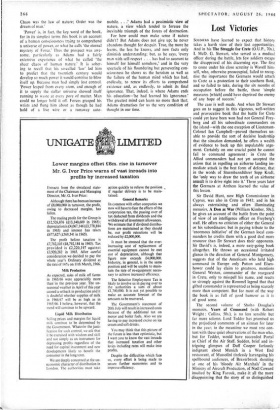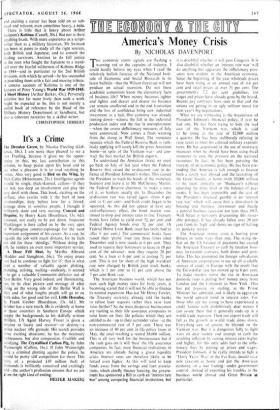Lost Victories
SOLDIERS have learned to expect that history takes a harsh view of their lost opportunities. And in his The Struggle for Crete (O.U.P., 70s.), I. McD. G. Stewart, who served as a medical officer during the battle, lets few soldiers escape the disapproval of his discerning eye. The first to come under his close scrutiny is Wavell him- self, who, otherwise preoccupied, failed to recog- nise the importance the Germans would attach to Crete as a protection to their southern flank, and so failed to take, during the six months of occupation before the battle, those 'simple measures [which] could have deprived the enemy of any hope of success.'
The case is well made. And when Dr Stewart goes on to suggest in this vigorous, well-written and provocative book that the battle for Crete could yet have been won had not General Frey- berg and all his subordinate commanders on the island—with the one exception of Lieutenant- Colonel Ian Campbell—proved themselves un- able to provide the sort of decisive leadership that the situation demanded, he offers a wealth of evidence to back up this unpalatable argu- ment. Certainly on one crucial point he cannot fail to command agreement : in Crete the Allied commanders had not yet accepted the axiom that in repelling an airborne landing im- mediate attack is the best form of defence, that in the words of Sturmbannfiihrer Sepp Kraft, the 'only way to draw the teeth of an airborne assault is to drive right into it.' Three years later the Germans at Arnhem learned the value of this lesson.
Sir David Hunt, now High Commissioner in Cyprus, was also in Crete in 1941; and in his always entertaining and often illuminating memoirs, A Don at War (William Kimber, 50s.), he gives an account of the battle from the point of view of an intelligence officer on Freyberg's staff. He offers no criticism of either the General or his subordinates; but in paying tribute to the 'enormous initiative' of the German local com- manders he credits them with a good deal more resource than Dr Stewart does their opponents. Sir David's is, indeed, a more easy-going book altogether. He throws an occasional irritated glance in the direction of General Montgomery, suggests that of the Americans who held high command in Europe only Patton and Eisen- hower could lay claim to greatness, mentions General Weston, commander of the rearguard in Crete, only to misspell his name, and reacts so strongly against the Rommel legend that that gifted commander is represented as being scarcely more than competent. But for most of the way the book is as full of good humour as it is of good sense.
The second volume of Sholto Douglas's memoirs, Years of Command (with Robert Wright : Collins, 50s.), is no less sensible but far more solemn. Lord Tedder has promised us the prejudiced comments of an airman for later in the year; in the meantime we must rest con- tent with these quiet observations of the man who, but for Tedder, would have succeeded Portal as Chief of the Air Staff. Sudden, brief and in- triguing glimpses of Duff Cooper furiously indignant about Munich in a West End restaurant, of Mussolini tirelessly haranguing his spellbound audiences, of Beaverbrook shouting at one of his 'bloody Air Marshals' in the Ministry of Aircraft Production, of Noel Coward insulted by King Farouk, make it all the more disappointing that the story of so distinguished and exciting a career has been told on so sub- dued and reticent., even sometimes heavy, a note.
There is little that is heavy about Arthur Swinson's Kohima (Cassell, 30s.). But nor is there anything brash. With more experience as a script- writer than as a military historian, Mr Swinson has been at pains to study all the right sources, both British and Japanese, and to consult the leading survivors. Anxious to do full justice to the men who fought the Japanese to a stand- still over the fearful wilderness of Kohima Ridge in 1944—and in particular to the 2nd British Division, with which he served—he has succeeded in providing them with a fair and moving tribute. A concise account of Kohima is one of the features of Peter Young's World War 1939-1945: A Short History (Arthur Barker, 45s.). Perversely selective but far more lively than such a work might be expected to be, this is not merely a useful book of reference by the Head of the Military History Department at Sandhurst, but also a coherent narrative by a skilful writer.
CHRISTOPHER HIBBERT































 Previous page
Previous page